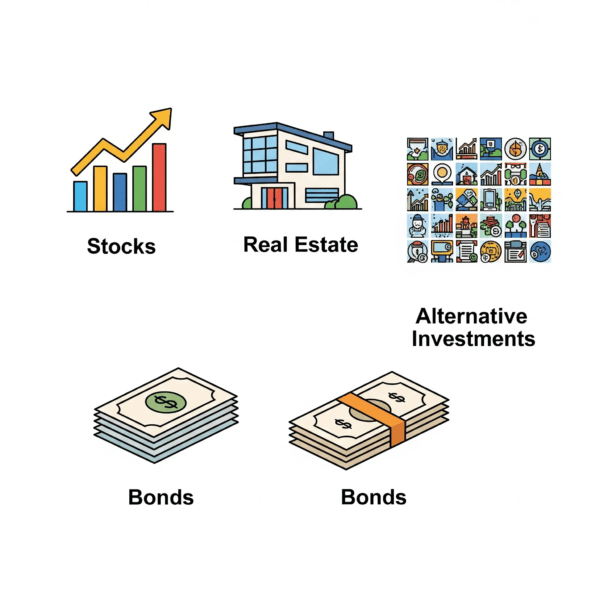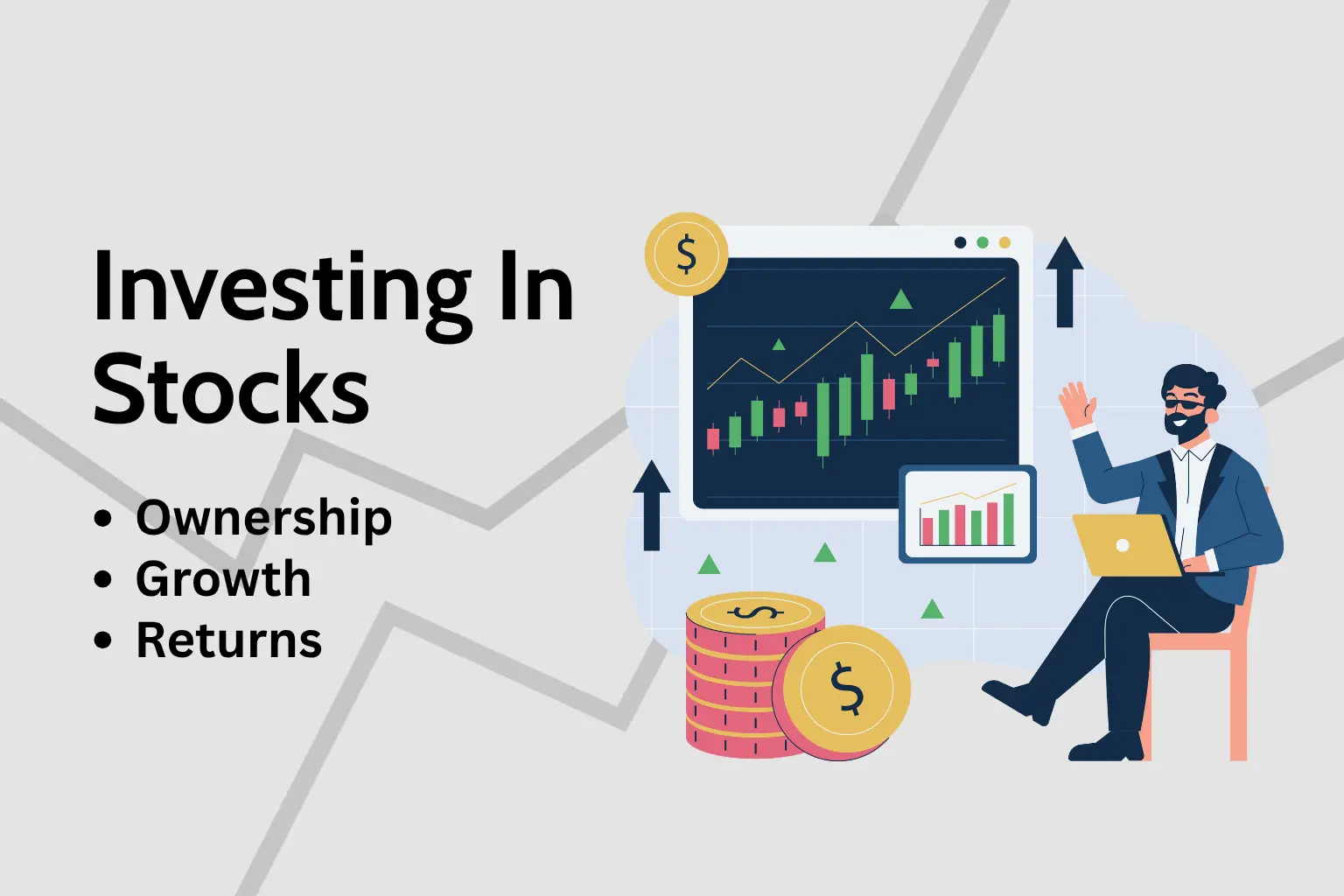Last Updated: November 18, 2025
Managing wealth in 2025 is not just about saving money or picking the right stocks. It’s about having a smart and complete strategy that helps you grow, protect, and pass on your wealth. If you’re earning a high income, your financial situation is more complex—and so are your needs.
Many high-income professionals struggle with one big question: “How can I keep more of what I earn?” With rising living costs, new tax rules, and constant market changes, managing wealth has become more challenging than ever before. You’ve worked hard to earn your income—now it’s time to make sure it works hard for you in return.
You may already be investing, saving, or even meeting with an advisor, but is your current strategy really the best for your future? Are you taking advantage of all the tools available to reduce taxes, grow your investments, and protect your legacy? Most importantly, do you have a clear plan that adapts to changes in the economy and your life?
- Smart wealth management starts with understanding your unique financial situation and goals.
- Maximize tax-advantaged accounts to reduce your taxable income and boost retirement savings.
- Diversify investments beyond traditional stocks to include real estate, private equity, and alternative assets for better risk management.
- Implement tax-efficient strategies like tax loss harvesting and charitable giving to keep more of your earnings.
- Regularly update and personalize your financial plan to adapt to life changes and market conditions.
- Working with a fiduciary advisor can provide unbiased guidance tailored to your complex needs.
- Effective wealth management is not just about money—it’s about peace of mind, security, and leaving a lasting legacy.
This guide is designed to help high income earners like you take full control of your financial future. We’ll walk you through practical, proven, and easy-to-understand wealth management strategies that are highly relevant in 2025. These aren’t generic tips—they’re tailored for people who earn above-average income and want to secure long-term success.
Each section will break down complex financial topics into simple language, so even if you’re not a finance expert, you’ll still get maximum value. From smarter tax moves to estate planning tricks and modern investment strategies, we’ll cover everything you need to know to get ahead.
You don’t need a background in finance to benefit from this article. All you need is the willingness to plan smartly and take action. So if you’re ready to level up your finances and make your money work harder, this article is for you.
Let’s begin your journey to smarter wealth management in 2025.
1. Maximize Tax-Advantaged Accounts
One of the smartest ways to build long-term wealth is by taking full advantage of tax-advantaged accounts. As a high income earner, you’re likely in the top tax brackets, which means you could be paying a big chunk of your income in taxes. The goal here is to use legal strategies to lower your tax bill while saving for retirement at the same time.
Use All Available Retirement Vehicles
Start by maxing out your 401(k), 403(b), or similar employer-sponsored retirement plan. For 2025, the contribution limit is expected to be $23,000. If you’re 50 or older, you can contribute an additional $7,500 as a catch-up contribution. These pre-tax contributions lower your taxable income while your investments grow tax-deferred.
Roth IRA and Backdoor Roth IRA
If you’re ineligible to contribute directly to a Roth IRA due to income limits, consider the Backdoor Roth IRA. It’s a method where you make a non-deductible contribution to a Traditional IRA and then convert it to a Roth. The Mega Backdoor Roth, available through some 401(k) plans, allows you to contribute after-tax dollars and convert up to $66,000 annually.
Health Savings Account (HSA)
If you have a high-deductible health plan, an HSA is another powerful tool. You contribute pre-tax dollars, the account grows tax-free, and withdrawals are tax-free when used for medical expenses. It’s like a triple tax advantage account—perfect for high earners planning for future healthcare costs.
Key Benefit: These accounts reduce your tax burden now while helping you build wealth for the future.

2. Diversify with Alternative Investments
High income often means you have more capital to explore beyond traditional stocks and bonds. That’s where alternative investments come in. These options can boost returns, reduce risk through diversification, and offer unique benefits not available in traditional markets.
Real Estate Syndications
Instead of buying properties yourself, you can invest in a syndicate—where multiple investors pool funds to buy larger properties like apartment complexes. These generate passive income, provide tax deductions through depreciation, and often outperform public equities in the long run.
Private Equity & Venture Capital
For accredited investors, private equity and venture capital offer opportunities to invest in startups and private businesses with high growth potential. While riskier, they can offer impressive returns, and your investment is not subject to the daily swings of the public market.
Commodities, Art, and Crypto
Diversification can also include precious metals, fine art, and digital assets like cryptocurrencies. These have varying risk levels and can act as hedges against inflation or market downturns.
Key Benefit: Alternative investments help high earners reduce portfolio volatility and tap into non-correlated assets for stronger long-term performance.
3. Employ Strategic Tax Loss Harvesting
Tax loss harvesting is one of the most underused strategies among high earners—but it can significantly lower your tax bill.
What Is It?
Tax loss harvesting means selling investments that have lost value to offset gains from investments you’ve sold at a profit. This helps you reduce your taxable capital gains, and in some cases, even offset a portion of your ordinary income.
When to Use It
This strategy is especially powerful during volatile markets. Let’s say your tech stock took a hit—selling it at a loss can be used to offset a gain from a property sale or another asset, saving you thousands in taxes.
How to Implement It
It’s best to use this strategy under professional guidance or through a robo-advisor that automates the process. Just be mindful of the IRS’s wash sale rule, which disallows a loss if you repurchase the same investment within 30 days.
Key Benefit: Reduces your tax bill and increases overall portfolio efficiency—letting your wealth grow faster with fewer losses to taxes.
4. Create an Estate Planning Blueprint
Estate planning isn’t just for the ultra-wealthy. It’s essential for anyone who wants to protect their assets, reduce estate taxes, and ensure a smooth wealth transfer to heirs or charities.
Build a Trust
Trusts are powerful legal structures that allow you to manage your assets during your lifetime and pass them on after death without going through probate. Revocable living trusts offer flexibility, while irrevocable trusts provide asset protection and tax advantages.
Annual Gifting
In 2025, you can gift up to $18,000 per recipient without triggering gift tax. This allows you to transfer wealth gradually and reduce the size of your taxable estate.
Power of Attorney and Healthcare Directives
A complete estate plan includes designating someone you trust to make financial or healthcare decisions if you’re unable. These documents prevent future legal issues and give peace of mind.
Life Insurance
Used correctly, life insurance can be a tool for wealth transfer, income replacement, or even tax-free borrowing through whole or universal policies.
Key Benefit: Ensures your legacy is protected, your assets go to the right people, and your family avoids legal or financial complications.
5. Optimize Charitable Contributions
If you’re charitably inclined, giving back can also be a tax-smart move. It’s one of the most effective and fulfilling wealth strategies for high income earners.
Donor-Advised Funds (DAFs)
DAFs allow you to donate a lump sum now, receive an immediate tax deduction, and distribute the funds to charities over time. You retain advisory rights, which lets you control the timing and causes your money supports.
Appreciated Assets
Instead of donating cash, consider gifting appreciated stock. This strategy lets you avoid capital gains tax and still claim a full-value charitable deduction.
Qualified Charitable Distributions (QCDs)
If you’re over 70½, you can donate directly from your IRA to a charity and exclude the amount from your taxable income. This satisfies your required minimum distribution and reduces taxes.
Key Benefit: Charitable giving lowers your taxable income while allowing you to make a real difference in causes that matter to you.

6. Build a Tax-Efficient Investment Portfolio
Many high income earners unknowingly pay too much in taxes on their investments. A tax-efficient portfolio ensures more of your money stays invested and working for you.
Asset Location Strategy
Place tax-heavy assets (like bonds, REITs, and mutual funds) in tax-advantaged accounts like IRAs or 401(k)s. Meanwhile, keep tax-efficient assets (like stocks or ETFs) in taxable brokerage accounts to minimize capital gains exposure.
Tax-Efficient Investment Vehicles
Index funds and ETFs are generally more tax-friendly than actively managed mutual funds because they generate fewer capital gains distributions. Municipal bonds are another great choice, as the interest earned is often tax-free at the federal and sometimes state level.
Rebalancing Smartly
Rebalancing your portfolio helps manage risk, but doing it without a plan can create tax liabilities. Use cash from new contributions or sell investments at a loss to rebalance more efficiently.
Key Benefit: Improves after-tax returns and keeps your portfolio aligned with your goals while minimizing tax drag.
7. Work With a Fiduciary Wealth Advisor
Even if you’re financially savvy, managing complex wealth scenarios on your own can be overwhelming. A fiduciary wealth advisor is a key partner in long-term success.
What Is a Fiduciary?
Fiduciary advisors are legally required to put your best interests first—unlike commission-based brokers who might sell you products that benefit them more than you.
Fee-Only Advisors vs. Commission-Based
Choose fee-only advisors who charge a transparent flat fee or a percentage of assets under management. They don’t earn commissions, which helps eliminate bias in advice.
Holistic Wealth Planning
The right advisor looks at every part of your financial life—investments, taxes, insurance, retirement, and estate planning—and builds a personalized roadmap for your future. They also help you adjust your strategy as your life changes.
Key Benefit: Saves time, avoids costly mistakes, and gives you expert guidance tailored to your high income and long-term goals.
| Wealth Strategy | Core Benefit | Who Should Use It | Risk Level |
|---|---|---|---|
| Tax-Advantaged Accounts | Reduces current taxes and boosts retirement savings through compounding. | All high earners with access to 401(k), IRA, or HSA plans. | Low |
| Alternative Investments | Offers portfolio diversification and high-return potential beyond stocks/bonds. | Accredited investors looking to grow wealth passively or non-traditionally. | Medium–High |
| Tax Loss Harvesting | Lowers capital gains taxes by offsetting them with realized losses. | Investors with taxable brokerage accounts and active portfolios. | Low |
| Estate Planning | Ensures tax-efficient transfer of wealth to heirs or charities. | Anyone with significant assets or family financial goals. | Low |
| Charitable Contributions | Reduces taxable income and supports causes you care about. | Philanthropic individuals looking to optimize deductions. | Low |
| Tax-Efficient Investing | Maximizes after-tax returns by placing assets in optimal accounts. | Investors with mixed portfolios (taxable + tax-deferred). | Low–Medium |
| Fiduciary Wealth Advisor | Offers expert financial planning tailored to your goals, free from bias. | Busy professionals and high-net-worth individuals seeking guidance. | Low |
The Role of Financial Education in Wealth Management
Wealth doesn’t grow by accident. Even if you’re earning a high salary, sustainable financial growth depends on how well you understand the tools and systems around you. Financial education empowers you to make smarter decisions—whether it’s choosing the right tax strategy, evaluating an investment opportunity, or understanding how interest rates affect your portfolio.
In 2025, the world of finance is becoming more complex. From cryptocurrency and digital assets to sophisticated estate planning laws, staying informed is key. That doesn’t mean you need a finance degree—it simply means committing to learning the basics and asking questions before making big decisions.
The more you learn, the more confident and in control you become. Wealth management isn’t just about hiring the right advisor—it’s about understanding enough to challenge decisions, ask smart questions, and align your strategy with your long-term goals.
Managing Risk Without Losing Growth Potential
A big part of wealth management is learning how to manage risk effectively. That doesn’t mean avoiding risk altogether—high income earners often need to take calculated risks to grow their wealth faster than inflation or taxes can erode it.
But smart risk management is about balance. You want to protect what you have while still giving your money room to grow. This could involve diversifying your portfolio across different sectors, balancing high-risk investments with safer ones, or using insurance to cover financial gaps.
In 2025, risk comes in many forms—not just market volatility, but also cybersecurity, legal exposure, and inflation. Effective wealth management includes creating a system where no single setback can derail your financial plan.
Avoiding Common Mistakes High Earners Make
Even with great income, many people fall into financial traps that set them back. One of the most common mistakes is lifestyle inflation—spending more simply because you earn more. This reduces your ability to save and invest, making long-term goals harder to reach.
Another big mistake is ignoring tax planning. Many high earners unknowingly overpay by not leveraging deductions, retirement accounts, or charitable giving strategies. Others may avoid estate planning because it seems too complicated or unnecessary—until it’s too late.
Understanding and avoiding these mistakes is a key part of wealth management. The earlier you catch them, the more financial freedom and security you’ll enjoy.
Creating a Personalized Wealth Strategy That Fits You
No two high earners are the same. Your career, family situation, goals, risk tolerance, and even where you live all affect the right approach to managing your wealth. That’s why a personalized strategy is essential.
Maybe your goal is early retirement. Maybe it’s building generational wealth. Or maybe you want to maximize your charitable impact. Whatever your priorities are, your wealth management plan should reflect them.
Working with a fiduciary advisor, tracking your progress, reviewing your goals annually, and adjusting to life changes will ensure your plan stays effective. In 2025 and beyond, flexibility and personalization are the keys to lasting financial success.
Additional Wealth Management Insights for 2025
- Review your financial plan annually: Life changes—so should your financial plan. Adjusting it every year helps keep you aligned with your evolving goals.
- Monitor interest rate trends: As rates shift in 2025, your loan payments, investment returns, and savings strategies may need to adapt.
- Stay liquid but not idle: Keeping some cash available for emergencies is smart, but excess idle cash loses value to inflation. Balance liquidity with growth.
- Bundle insurance for better protection: Consolidating life, disability, and liability insurance ensures you’re protected across different scenarios—and often saves money.
- Track net worth growth: Use tools or advisors to monitor your net worth over time. It keeps you motivated and shows if your strategies are working.
- Plan for generational impact: Wealth isn’t just for you—it’s a tool to support your children, parents, or future causes. Plan ahead with trusts or giving strategies.
Frequently Asked Questions
What is the best wealth management strategy for high income earners?
There isn’t a single “best” strategy—it depends on your goals. However, using tax-advantaged accounts, working with a fiduciary advisor, and diversifying your investments are excellent starting points. The key is to build a personalized plan that balances growth, protection, and legacy planning.
How can I reduce taxes on a high income in 2025?
You can reduce taxes through maxing out your 401(k) or HSA, using backdoor Roth IRAs, tax loss harvesting, charitable giving, and strategic asset placement. Working with a tax advisor ensures you follow the latest IRS guidelines while keeping more of your income.
Is it worth hiring a fiduciary financial advisor?
Absolutely. A fiduciary advisor is legally obligated to act in your best interest, not sell you products for a commission. For high earners with complex financial situations, an advisor can help optimize everything from investing to estate planning.
What is lifestyle inflation and how can I avoid it?
Lifestyle inflation happens when your spending increases as your income grows. While it’s natural to enjoy your success, unchecked spending can limit your ability to save and invest. The best way to avoid it is by budgeting, setting financial goals, and prioritizing long-term wealth over short-term luxuries.
Can real estate be part of a high income wealth plan?
Yes, real estate is often a key component of a high net worth portfolio. It provides passive income, tax advantages like depreciation, and long-term appreciation. You can invest directly in property or through syndications and REITs depending on your comfort level.
How often should I update my wealth management plan?
At least once a year—or after any major life change (like a new job, buying property, or having children). Reviewing your strategy helps ensure your plan stays aligned with your goals, risk tolerance, and current financial environment.
Final Thoughts
Wealth management in 2025 isn’t about chasing the latest investment trend—it’s about building a strong, secure financial foundation that adapts to your life and goals. As a high income earner, you have access to powerful tools, strategies, and opportunities that can create lasting impact—not just for yourself, but for future generations.
The key is to act intentionally. Whether you’re optimizing taxes, investing smarter, or planning your estate, every step you take brings you closer to long-term financial freedom. The earlier you start applying these wealth management strategies, the more control you gain over your future.
Remember, wealth isn’t just measured in dollars—it’s measured in peace of mind, flexibility, and legacy. So take the time to assess where you are, define where you want to be, and use this guide to build a plan that gets you there.
You’ve worked hard to earn your income. Now let your income work just as hard for you.
Author
You should always consult with a qualified financial advisor, legal professional, or licensed specialist before making any decisions based on the content published on Novozora.com. We do not guarantee the accuracy or completeness of any information and are not responsible for any losses or actions taken based on this content.
For more details, please read our full disclaimer here.








